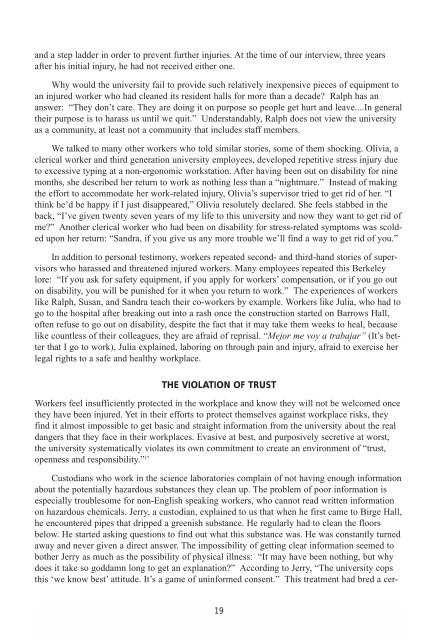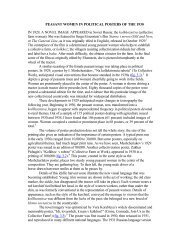Berkeley's Betrayal - Public Sociology @ Berkeley - University of ...
Berkeley's Betrayal - Public Sociology @ Berkeley - University of ...
Berkeley's Betrayal - Public Sociology @ Berkeley - University of ...
You also want an ePaper? Increase the reach of your titles
YUMPU automatically turns print PDFs into web optimized ePapers that Google loves.
and a step ladder in order to prevent further injuries. At the time <strong>of</strong> our interview, three yearsafter his initial injury, he had not received either one.Why would the university fail to provide such relatively inexpensive pieces <strong>of</strong> equipment toan injured worker who had cleaned its resident halls for more than a decade? Ralph has ananswer: “They don’t care. They are doing it on purpose so people get hurt and leave....In generaltheir purpose is to harass us until we quit.” Understandably, Ralph does not view the universityas a community, at least not a community that includes staff members.We talked to many other workers who told similar stories, some <strong>of</strong> them shocking. Olivia, aclerical worker and third generation university employees, developed repetitive stress injury dueto excessive typing at a non-ergonomic workstation. After having been out on disability for ninemonths, she described her return to work as nothing less than a “nightmare.” Instead <strong>of</strong> makingthe effort to accommodate her work-related injury, Olivia’s supervisor tried to get rid <strong>of</strong> her. “Ithink he’d be happy if I just disappeared,” Olivia resolutely declared. She feels stabbed in theback, “I’ve given twenty seven years <strong>of</strong> my life to this university and now they want to get rid <strong>of</strong>me?” Another clerical worker who had been on disability for stress-related symptoms was scoldedupon her return: “Sandra, if you give us any more trouble we’ll find a way to get rid <strong>of</strong> you.”In addition to personal testimony, workers repeated second- and third-hand stories <strong>of</strong> supervisorswho harassed and threatened injured workers. Many employees repeated this <strong>Berkeley</strong>lore: “If you ask for safety equipment, if you apply for workers’ compensation, or if you go outon disability, you will be punished for it when you return to work.” The experiences <strong>of</strong> workerslike Ralph, Susan, and Sandra teach their co-workers by example. Workers like Julia, who had togo to the hospital after breaking out into a rash once the construction started on Barrows Hall,<strong>of</strong>ten refuse to go out on disability, despite the fact that it may take them weeks to heal, becauselike countless <strong>of</strong> their colleagues, they are afraid <strong>of</strong> reprisal. “Mejor me voy a trabajar” (It’s betterthat I go to work), Julia explained, laboring on through pain and injury, afraid to exercise herlegal rights to a safe and healthy workplace.THE VIOLATION OF TRUSTWorkers feel insufficiently protected in the workplace and know they will not be welcomed oncethey have been injured. Yet in their efforts to protect themselves against workplace risks, theyfind it almost impossible to get basic and straight information from the university about the realdangers that they face in their workplaces. Evasive at best, and purposively secretive at worst,the university systematically violates its own commitment to create an environment <strong>of</strong> “trust,openness and responsibility.” 17Custodians who work in the science laboratories complain <strong>of</strong> not having enough informationabout the potentially hazardous substances they clean up. The problem <strong>of</strong> poor information isespecially troublesome for non-English speaking workers, who cannot read written informationon hazardous chemicals. Jerry, a custodian, explained to us that when he first came to Birge Hall,he encountered pipes that dripped a greenish substance. He regularly had to clean the floorsbelow. He started asking questions to find out what this substance was. He was constantly turnedaway and never given a direct answer. The impossibility <strong>of</strong> getting clear information seemed tobother Jerry as much as the possibility <strong>of</strong> physical illness: “It may have been nothing, but whydoes it take so goddamn long to get an explanation?” According to Jerry, “The university copsthis ‘we know best’ attitude. It’s a game <strong>of</strong> uninformed consent.” This treatment had bred a cer-19



